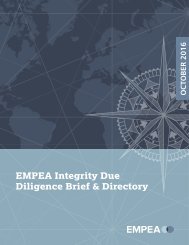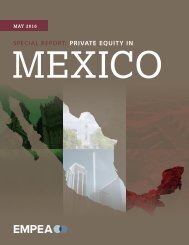Create successful ePaper yourself
Turn your PDF publications into a flip-book with our unique Google optimized e-Paper software.
environment is always the key area <strong>of</strong> competitiveness, always the most important —stable politics, good regulation, low<br />
bureaucracy, low corruption. Policy matters. Interestingly, we have grouped good taxation (i.e., low personal and corporate<br />
tax rates, especially the overall GDP taken by tax) in business environment; when you examine taxation on its own, it tracks<br />
business environment almost perfectly. So, in summary, always, always work on a friendly business environment, then<br />
emphasise infrastructure, followed by market access, followed by good people.<br />
4.2 Criticisms <strong>of</strong> African Investment Climate<br />
During the course <strong>of</strong> this report, 20 investors (investment managers, asset managers, high net worth individuals and private<br />
banks) were asked about their opinions <strong>of</strong> future investment in Africa. They were very positive about the future, assuming<br />
that the business environment improved and political risk was held in check. As expected, some focussed on very near term<br />
issues, e.g., the Ebola crisis, however, their longer-term concerns included:<br />
1 - Rule <strong>of</strong> Law And Corruption—probably the biggest and most common issue and one which could be discussed at<br />
great length. A number <strong>of</strong> people noted though that the “natural resource curse” might be abating due to the variety <strong>of</strong><br />
investments (more than just mining) and the variety <strong>of</strong> investors (e.g., China) proving that Africa was now ‘investable’ in<br />
turn spurring more reform and transparency—[“Twilight Of The Resource Curse,” The Economist, (10 January 2015),<br />
pages 43-44 – http://www.economist.com/news/middle-east-and-africa/21638141-africas-growth-being-poweredthings-other-commodities-twilight].<br />
2 - Pace <strong>of</strong> Reform—the pace at which decisions are made and changes are made was widely criticised during this<br />
research. Successful economic development will be hindered if the slow pace <strong>of</strong> decision-making is not addressed. It<br />
is hard to recommend a precise course <strong>of</strong> action; however, corruption was seen as a huge issue for virtually all <strong>of</strong> Africa.<br />
3 - Joint Marketing—it might appear from the reputational advantage exhibited by the centres, particularly Casablanca,<br />
that marketing has gone well. However, it was clear from interviews, and from the cross-correlations in ratings, that<br />
Africa needs to market Africa as much as individual centres. Another region with a similar problem is the Caribbean.<br />
Once there are problems, e.g., Antiguan scandals, then investors flee the region, not the specific centre.<br />
4 - Infrastructure—an international financial centre needs high quality transport, building and ICT infrastructure. High<br />
quality infrastructure generally contributes to economic productivity, innovation, entrepreneurship and business<br />
sophistication. Casablanca has done as great deal to improve its transport infrastructure with highways being built. The<br />
port is being developed and in time the airport will need considerable expansion or replacement. Similar infrastructure<br />
tales must exist elsewhere, but investors were not aware <strong>of</strong> many.<br />
5 - Clear, Comparable Regulatory Frameworks—two clear African opportunities are local fund management for inward<br />
investment and Islamic finance. Both <strong>of</strong> these sectors need very specific legislation, which can be and should be put in<br />
place fairly quickly. There are examples <strong>of</strong> best practice in Europe and the Middle East, which can be copied.<br />
6 - People—primary and secondary education are perceived to be adequate in the few centres covered by GFCI, for the<br />
moment. If typical financial centre development is followed, then a large skills shortage will emerge quickly. Several<br />
interviewees were expecting an extremely tight labour market in the near future. However, what they wanted were<br />
more basic skills <strong>of</strong> bookkeeping, compliance, database management, not advanced financial skills. More vocational<br />
qualifications, rigorously vetted, were investors’ key concerns.<br />
7 - Accurate Information—people wanted clear, validated information. They wanted pan-Africa information. They wanted<br />
credit information on companies, on people. One report was particularly interesting in illustrating current problems,<br />
“Stock Exchanges in Sub-Saharan Africa: Capturing Intent Towards ESG Requirements” (ACCA, July 2014) - http://<br />
www.accaglobal.com/gb/en/technical-activities/technical-resources-search/2014/july/stock-exchanges-in-sub-saharanafrica.html.<br />
Examining stock exchanges in Botswana, Ghana, Malawi, Kenya, Nigeria, Mauritius, South Africa, Uganda,<br />
130 |





